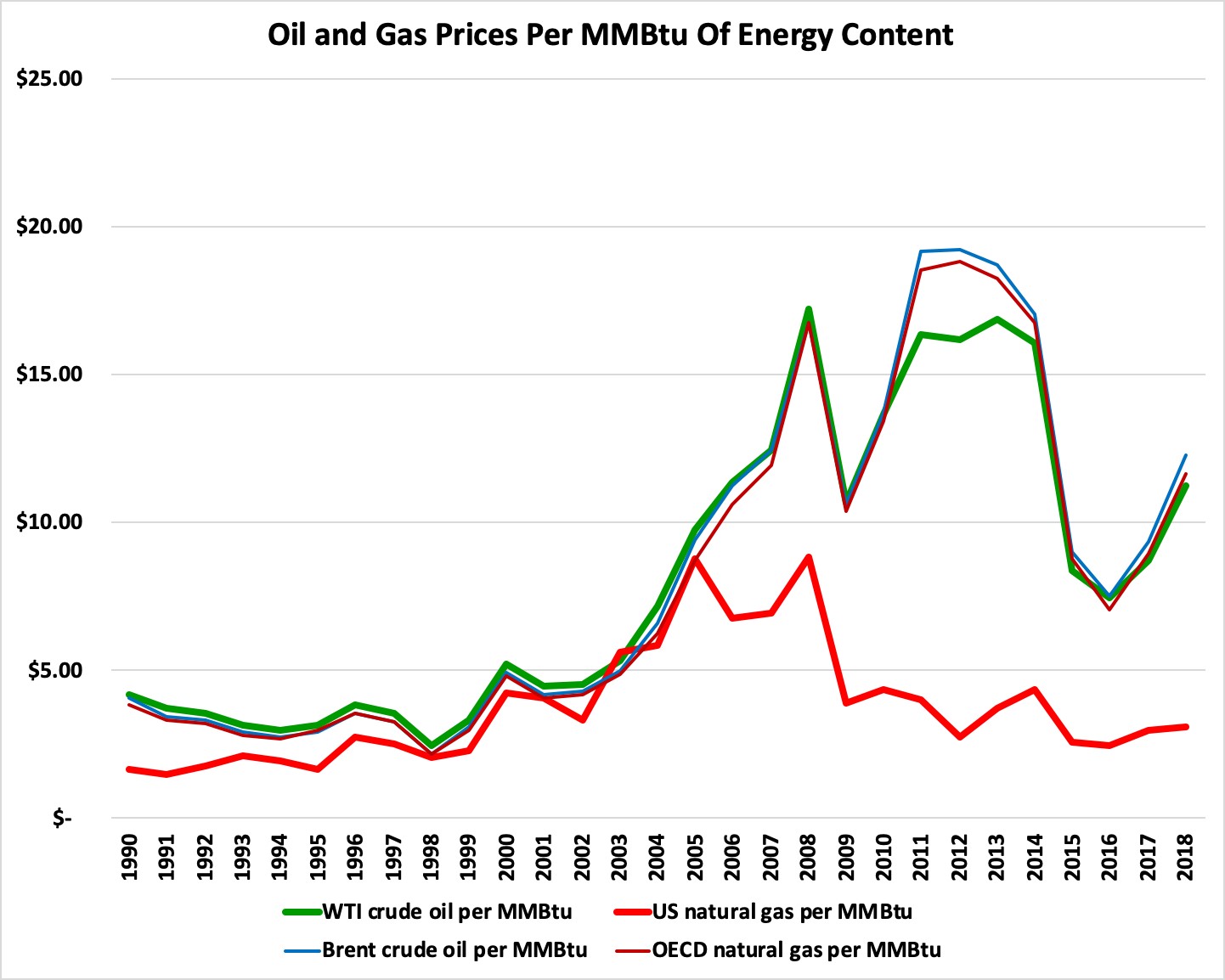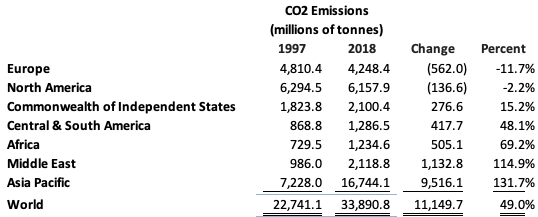Oil Drove Recovery
Over the last decade, the oil industry converted $1.2 trillion of import spending into GDP while saving US energy consumers another $2.4 trillion.
As presidential hopefuls scrum for leadership positions within the Democrat party, they’re uniformly predicting climate change catastrophe and proposing draconian changes in the way the US creates and uses energy. Since the incarnate evils in their green dogma are big oil and hydraulic fracturing, you’d think they were running against Exxon-Mobil (XOM) and Halliburton (HAL).
This article quantifies the oil industry’s contribution to America’s post-crash economic recovery using data from BP’s Statistical Review of World Energy. Then it considers whether draconian changes in US energy policy can make a meaningful difference in global CO2 emissions trends.
The last decade was a period of extraordinary change for domestic oil and gas producers as rig automation slashed costs, and precision horizontal drilling and hydraulic fracturing facilitated the development of shale formations that were previously considered uneconomic. Since the Obama administration was far from “oil-friendly,” I think the oil industry’s accomplishments despite gale-force political headwinds were mind-boggling.
From 2009 through 2018, the oil industry:
- Doubled domestic oil production and made the US the world’s largest oil producer;
- Slashed US oil imports from 4 billion barrels in 2008 to 1 billion barrels in 2018;
- Converted $1.2 trillion of import spending into gross domestic product;
- Made natural gas 75% cheaper in the US than it is in other industrialized countries;
- Saved US consumers $2.4 trillion on their natural gas bills; and
- Drove oil prices down to levels last seen in 2005.
Does the magnitude of these accomplishments surprise you as much as it did me?
Did you know the oil industry delivered American energy independence while politicians were throwing the weight of US energy policy behind solar panels, wind turbines, and electric cars?
Did you know that industrialized countries in Europe and Asia didn’t share in this windfall?
Let’s drill down a little deeper and add some color to the landscape.
A barrel of oil contains 5.8 million British thermal units (MMBtu) of energy, and a thousand cubic feet (Mcf) of natural gas contains 1 MMBtu of energy. Historically, oil and gas prices were tightly coupled based on energy content, and the cost of a barrel of oil was roughly 5.8 times the cost of an Mcf natural gas.
In the US, the coupling of oil and gas prices began to breakdown in 2006 as rig automation, precision horizontal drilling and hydraulic fracturing gave companies the ability to produce oil and gas from massive but previously uneconomic shale resources. Since gas is almost always transported by pipeline and it must be liquified for export, the plentiful new supplies drove gas prices down to previously unimaginable lows.
This graph summarizes year-to-year changes in the price of one MMBtu of energy from West Texas Intermediate crude, Henry Hub natural gas, Brent crude, and OECD natural gas, for the period from 1990 through 2018.

A cursory glance at the graph shows:
- The sharp decoupling of WTI crude and Henry Hub gas prices beginning in 2006;
- The surprising decoupling of WTI crude and Brent crude prices starting in 2011; and
- The abrupt slide in global oil prices starting in 2014.
The graph also shows that the OECD gas price remained tightly coupled with Brent crude, so gas consumers in Europe and Asia did not benefit from the decoupling of US oil and gas prices.
While a decade of bargain-basement natural gas prices and five years of low oil prices have not been a boon for debt-laden oil and gas producers, the cumulative benefit to the US economy is almost incomprehensible.
- A $1.2 trillion direct contribution to GDP from reduced oil import spending; and
- A $2.4 trillion addition to individual consumers’ discretionary income, an average of $773 per year for every man, woman and child in the country.
Since GDP increased from $14.7 trillion in 2008 to $20.6 trillion in 2018, I think $3.6 trillion of direct economic impacts from the oil industry was an enormous contribution to our post-crash recovery. It would be fascinating to estimate the impact including economic multiplier effects, but that level of analysis is out of my depth.
While presidential hopefuls wax apocalyptic over the risk of catastrophic climate change, their proposed solutions can’t make a difference because emissions aren’t increasing from activities in industrial economies. They’re rising because less-developed countries are consuming more energy as they climb out of poverty. The following table summarizes changes in regional CO2 emissions from hydrocarbon consumption since the 1997 adoption of the Kyoto Protocols.

While North America and Europe pared their collective CO2 footprint by 6%, the rest of the world grew emissions by 102%. If North America and Europe had completely eliminated their CO2 emissions after Kyoto, global CO2 emissions would still have increased by 3%.
Unfortunately, industrialized countries can’t act unilaterally to offset emissions growth in less-developed countries. No matter what North America and Europe do, it will be too little and too late. Besides, government policies that cut hydrocarbon use in industrialized economies will simply increase supplies in less-developed countries where a human being who has a choice between freezing in the dark in harmony with Gaia or expanding his carbon footprint will pick his health and comfort over some meddlesome foreign politician’s climate change concerns.
Pharmaceutical companies can’t sell medicines without credible proof of safety and efficacy in the treatment of a specific disease. Should we accept less from would-be policy-makers?




Excellent read, well worth the accolades. The ending really sums up how critical this issue is.
"Does the magnitude of these accomplishments surprise you as much as it did me?" Why yes, perhaps even more so!
I was more concerned with this part:
While North America and Europe pared their collective CO2 footprint by 6%, the rest of the world grew emissions by 102%.
That's deeply troubling.
There is no way to argue with the author's conclusions. This is all that needs to be said upon the subject.
I agree completely.
Great article.